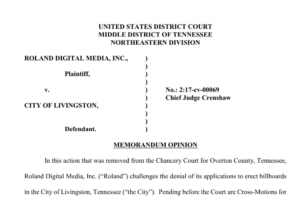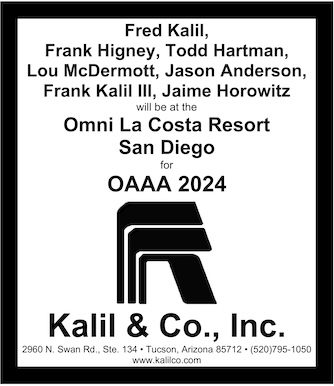Federal appellate judges appointed by Presidents Clinton, George H.W. Bush, and Obama will hear an important billboard case on January 30.
The case (Thomas v. Schroer) challenges the constitutionality of billboard law on free speech grounds. The US Sixth Circuit Court of Appeals announced that these three judges will hear the case (in Cincinnati):
- Chief Judge R. Guy Cole, Jr., a Clinton appointee who worked in private practice, at the Department of Justice, and as a bankruptcy judge before joining the Sixth Circuit in 1995.

- Judge Alice M. Batchelder was a federal judge in the Northern District of Ohio before joining the Sixth Circuit. The Sixth Circuit includes Kentucky, Michigan, Ohio, and Tennessee. She was nominated by President George H.W. Bush.

- Judge Bernice B. Donald, an Obama appointee, was a state-court judge in Tennessee and then a federal judge in the Western District of Tennessee before joining the appeals court.

In this billboard case, the plaintiff is billboard builder William H. Thomas, Jr. In 2017, a federal judge in the Western District of Tennessee (Jon P. McCalla) ruled in Thomas’ favor, invalidating Tennessee’s billboard law as unconstitutional , content-based regulation of speech.
Thomas and his counsel point to the differing regulatory treatment of on-premise and off-premise signs to support their claim that billboard law is based on content. The government argues that billboard regulation is based on location, not content.
 Just as the Sixth Circuit Court of Appeals prepares to hear the Thomas case — which comes from the Western District of Tennessee — a federal judge in the Middle District of Tennessee says billboard regulation is not based on content.
Just as the Sixth Circuit Court of Appeals prepares to hear the Thomas case — which comes from the Western District of Tennessee — a federal judge in the Middle District of Tennessee says billboard regulation is not based on content.
On December 26, 2018, Chief Judge Waverly D. Crenshaw, Jr. (Middle District of Tennessee) upheld a local billboard ordinance (Roland Digital Media v. City of Livingston). The on-premise/off-premise distinction does not make billboard regulation content-based, ruled Judge Crenshaw.
“The fact that commercial signs can only be placed in certain locations does not amount to a content-based restriction,” said Judge Crenshaw. “As the City points out, the ordinance does not prohibit signs expressing a viewpoint and one can erect a sign that says ‘Trump is Horrible,’ or ‘Trump is Great.'”
Insider will continue to keep you up to date on this important litigation. If you have questions or concerns, let us know by filling out the comment box below.
[wpforms id=”8663″]
Paid Advertisement

















